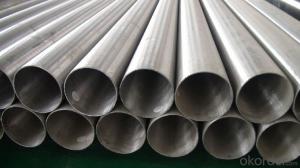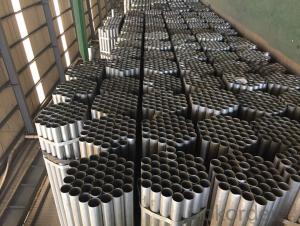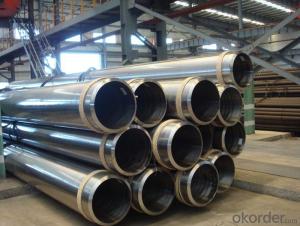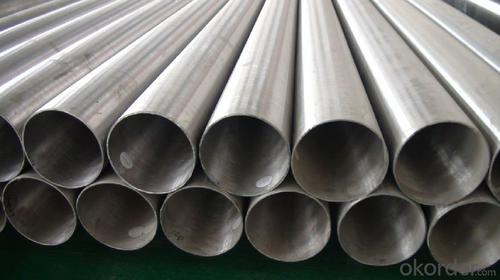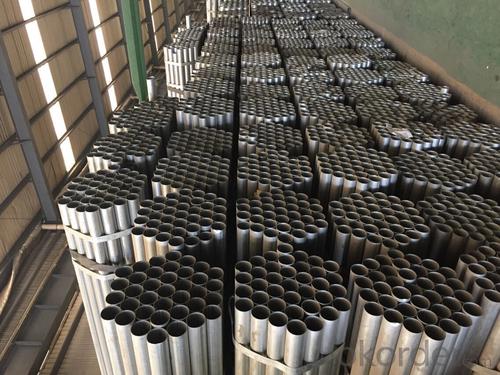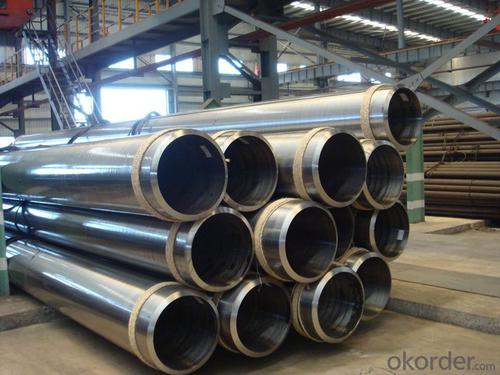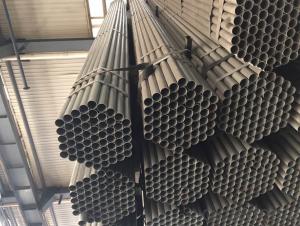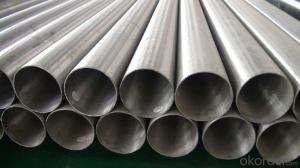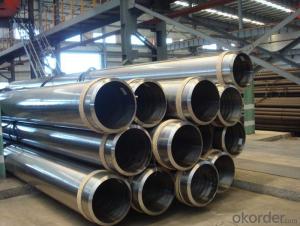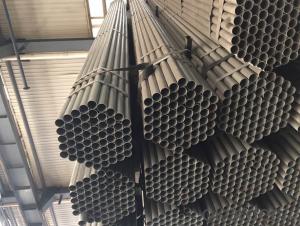Stainless Steel Welded Pipe ASTM A358/A316
- Loading Port:
- Tianjin
- Payment Terms:
- TT or LC
- Min Order Qty:
- 60 m.t.
- Supply Capability:
- 9000 m.t./month
OKorder Service Pledge
OKorder Financial Service
You Might Also Like
1、Structure of /Stainless Steel Welded Pipe ASTM A358/A312Description:
Stainless steel welded pipe is actually a cover term, covering a wide range of alloy and making them suitable for different attributes that are used in a very wide and large numbers of different industries.
2、Main Features of the Stainless Steel Welded Pipe ASTM A358/A312:
• High manufacturing accuracy
• High strength
• Small inertia resistance
3、Stainless Steel Welded Pipe ASTM A358/A312Images:
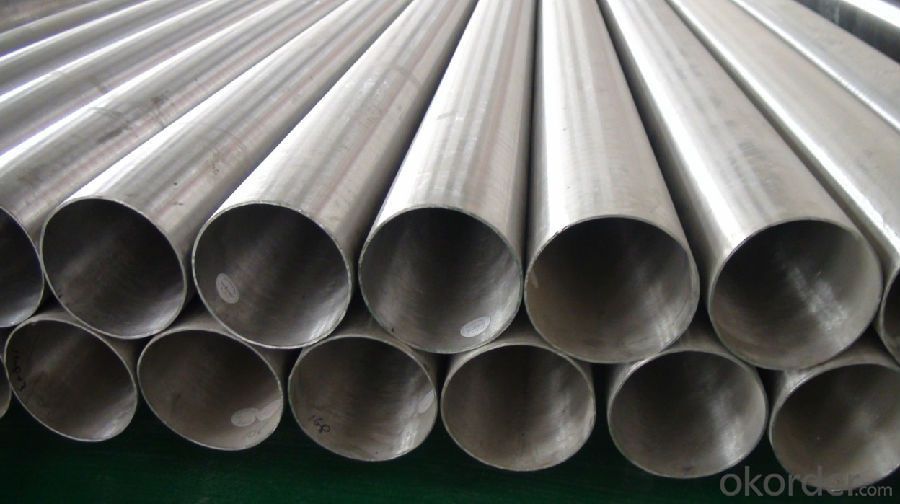
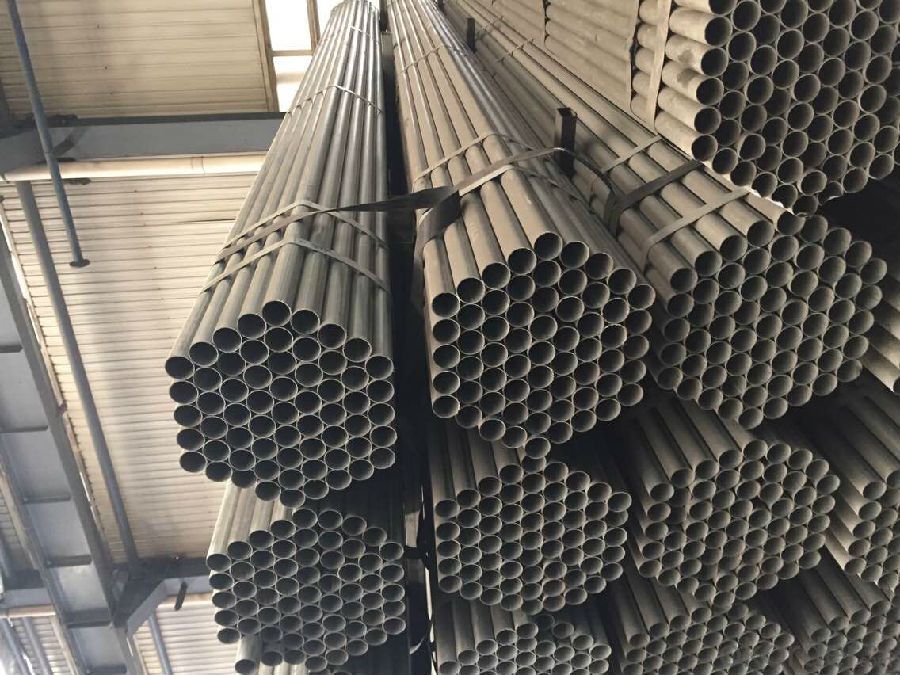
4、Stainless Steel Welded Pipe ASTM A358/A312/A778 Specification:
Size:
| Outside diameter | Outside | Thickness | ||||
| SCH 5S | SCH 10S | SCH 20S | SCH 40S | |||
| (A) | (B) | mm | mm | mm | mm | mm |
| 350 | 14′ | 355.6 | 3.96 | 4.78 | 7.92 | 11.13 |
| 400 | 16′ | 406.4 | 4.19 | 4.78 | 7.92 | 12.7 |
| 450 | 18′ | 457.2 | 4.19 | 4.78 | 7.92 | 14.27 |
| 500 | 20′ | 508 | 4.78 | 5.54 | 9.53 | 15.09 |
| 550 | 22′ | 558.8 | 4.78 | 5.54 | 9.53 | 15.09 |
| 600 | 24′ | 609.6 | 5.54 | 6.35 | 9.53 | 17.48 |
| 650 | 26′ | 660.4 | 5.54 | 7.92 | 12.7 | 17.48 |
| 700 | 28′ | 711.2 | 5.54 | 7.92 | 12.7 | 17.48 |
| 750 | 30′ | 762 | 6.35 | 7.92 | 12.7 | 17.48 |
| 800 | 32′ | 812.8 | 7.9 | 12.7 | 17.48 | |
| 850 | 34 | 863.6 | 7.92 | 12.7 | 17.48 | |
| 900 | 36′ | 914.4 | 7.92 | 12.7 | 19.05 | |
| 1000 | 40′ | 1016 | 9.53 | |||
Tolerances on dimensions table:
| Standard | Outside(mm) | Thickness(mm) | Length(mm) | |
| ASTM A312 | ≤48.26 | -0.4 | +No special provisions(Unspecified)-12.50% | Appoint LengthDefinite cut length+6.40 |
| >48.26~114.30 | 0 | 0 | ||
| >114.30~219.08 | 0.8 | |||
| >219.08~457.20 | 1.6 | |||
| >457~660 | -4 | |||
| >660~864 | -5 | |||
| >864~1219 | -5.6 | |||
| JIS G3459 | <30.00 ±0.30≥30.00 ±1.00% | <2.00 ±0.20≥2.00 ±10% | Appoint LengthDefinite cut Length | |
| GB/T 12771 | <13.00 ±0.2013.00~40.00 ±0.30≥40.00 ±0.80% | ≤4.00 +0.50 -0.60>4.00 ±10% | 20 | |
| EN 10217-7 | D1±1.50% with±0.75mm(min)D2±1.00% with±0.50mm(min)D3±0.75% with±0.30mm(min) | T1±15.00% with±0.60mm(min)T2±12.5% with±0.40mm(min)T3±10.00% with±0.20mm(min) | ≤6000 +5.00 -06000~12000 +10.00 -0 | |
| D4±0.5% with±0.10mm(min) | T4±7.50% with±0.15mm(min) | |||
| T5±5.00% with±0.10mm(min) | ||||
| EN ISO 1127 | ||||
5、FAQ of Stainless Steel Welded Pipe ASTM A358/A312/A778:
①How is the quality of your products?
Our products are manufactured strictly according to national and internaional standard, and we take a test on every pipe before delivered out. If you want see our quality certifications and all kinds of testing report, please just ask us for it.
Guaranteed: If products’ quality don’t accord to discription as we give or the promise before you place order, we promise 100% refund.
②Why should you chose us?
Chose happens because of quality, then price, We can give you both.Additionally, we can also offer professional products inquiry, products knowledge train(for agents), smooth goods delivery, exellent customer solution proposals.Our service formula: good quality+good price+good service=customer’s trust
SGS test is available, customer inspection before shipping is welcome, third party inspection is no problem.
Any question, pls feel free to contact us !
- Q: Are steel pipes suitable for underground oil pipelines?
- Yes, steel pipes are suitable for underground oil pipelines. Steel is a common material used for oil pipelines due to its high strength, durability, and resistance to corrosion. Underground oil pipelines are exposed to various external factors such as soil movement, moisture, and chemical substances, and steel pipes are able to withstand these conditions effectively. Additionally, steel pipes can be welded together to create a seamless and continuous pipeline, reducing the risk of leaks or ruptures. Moreover, steel pipes have been used successfully in the oil industry for many years, providing a reliable and cost-effective solution for transporting oil underground.
- Q: Can steel pipes be used for oil drilling operations?
- Yes, steel pipes are commonly used for oil drilling operations. They possess the necessary strength and durability to withstand the harsh conditions of drilling and transporting oil. Additionally, steel pipes have excellent corrosion resistance, making them suitable for long-term use in the oil and gas industry.
- Q: How are steel pipes coated to prevent corrosion?
- Steel pipes are coated to prevent corrosion using various methods and materials. One common method is applying a protective layer of paint or epoxy on the surface of the pipe. This coating acts as a barrier between the steel and the external environment, preventing moisture and corrosive substances from coming into direct contact with the metal. Another technique involves using a process called galvanization, where the steel pipes are coated with a layer of zinc. Zinc is highly resistant to corrosion and acts as a sacrificial anode, meaning it will corrode in place of the steel if any damage occurs to the coating. This sacrificial protection ensures that the steel remains intact and corrosion-free. Additionally, steel pipes can be coated with polyethylene or polypropylene materials through a process called fusion bonding. In this method, the plastic material is melted onto the steel surface, creating a strong bond that provides excellent resistance against corrosion. This type of coating is commonly used in offshore and underground pipelines. Furthermore, another technique for preventing corrosion is the application of a layer of corrosion-resistant alloy onto the steel pipe. This alloy is typically a combination of metals such as nickel, chromium, and molybdenum, which provide superior protection against corrosion in harsh environments. Overall, the choice of coating method depends on various factors such as the operating conditions, the type of corrosive substances present, and the expected lifespan of the steel pipes. By effectively applying these coatings, steel pipes can be safeguarded against corrosion, extending their durability and ensuring the integrity of the infrastructure they are used in.
- Q: What is the pressure rating of steel pipes?
- The pressure rating of steel pipes varies depending on the specific grade and size of the pipe. However, steel pipes are known for their high strength and durability, allowing them to withstand high-pressure applications.
- Q: What are the different grades of steel pipes?
- There are several grades of steel pipes, including ASTM A53, ASTM A106, and API 5L. These grades vary in terms of their composition, strength, and intended use.
- Q: How big is the seamless steel tube of DN50?
- Domestic steel pipe diameter is generally divided into A series and B series, DN50 pipe diameter of 60mm and 57mm respectively, the wall thickness should be based on your design pressure, temperature, pipe material to calculate.
- Q: How are steel pipes used in the construction of nuclear power plants?
- Steel pipes are used in the construction of nuclear power plants for various purposes, including transporting coolant, steam, and gases, as well as providing structural support for the overall system. These pipes are specifically designed to withstand high pressures, extreme temperatures, and corrosive environments, ensuring the safe and efficient operation of the nuclear power plant.
- Q: How are steel pipes protected against external damage?
- Steel pipes are protected against external damage through various methods such as anti-corrosion coatings, insulation materials, and cathodic protection systems. These measures help prevent corrosion, impact, and abrasion, ensuring the durability and longevity of the pipes.
- Q: Can steel pipes be painted or coated?
- Yes, steel pipes can be painted or coated. Painting or coating steel pipes helps to protect them from corrosion, rust, and other environmental factors. It also enhances their aesthetic appearance and can be used to indicate the type of pipe or its function.
- Q: What is the difference between steel pipe and aluminum pipe?
- The main difference between steel pipe and aluminum pipe lies in their composition and properties. Steel pipe is made primarily of iron and carbon, with other elements added to enhance its strength and durability. It is known for its high tensile strength, resistance to corrosion, and ability to withstand high temperatures and pressure. On the other hand, aluminum pipe is made from aluminum, which is a lightweight metal known for its excellent corrosion resistance, thermal conductivity, and malleability. While steel pipe is generally stronger and more rigid, aluminum pipe is lighter and more easily manipulated. Additionally, steel pipe is often used in applications where strength and durability are critical, such as in construction and plumbing, while aluminum pipe is commonly used in industries that require lightweight materials, such as aerospace and automotive.
Send your message to us
Stainless Steel Welded Pipe ASTM A358/A316
- Loading Port:
- Tianjin
- Payment Terms:
- TT or LC
- Min Order Qty:
- 60 m.t.
- Supply Capability:
- 9000 m.t./month
OKorder Service Pledge
OKorder Financial Service
Similar products
Hot products
Hot Searches
Related keywords
